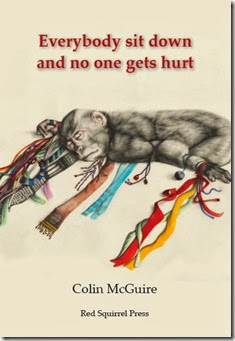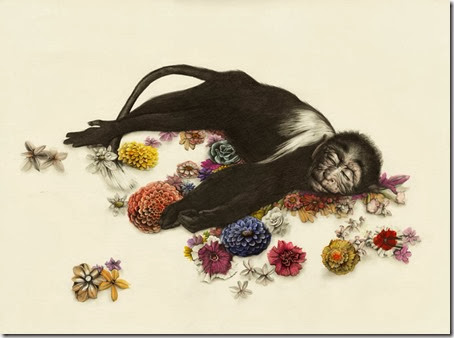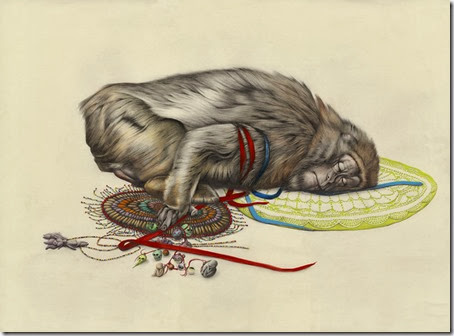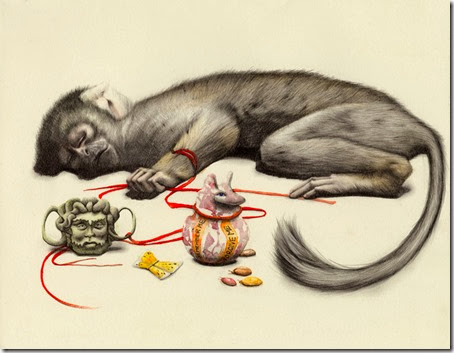As long as necessity is socially dreamed, dreaming will remain a social necessity. The spectacle is the bad dream of a modern society in chains and ultimately expresses nothing more than its wish for sleep. The spectacle is the guardian of that sleep. – Guy Debord, The Society of the Spectacle
How to read a book of poetry? I ask myself this every time I pick one up. Always I find myself looking for some kind of narrative. Why are the poems arranged in the particular order in which we find them? Where’s the poet leading me? Why’s the first poem the first poem? Why’s the last poem the last poem? Whether or not the poet put a great deal of thought or even any thought into the order I find myself still wanting to impose a sense of order on them. It helps if there is some common ground to the poems as is the case here. What follows is my reading of Everybody lie down and no one gets hurt. I have no doubt no one else will read it this way.
The first thing I noticed about this collection was the quality of the sound. I’ve known Colin for years and regularly read the poems he posts on his blog, Notes from a Glaswegian Immaturity—he has at times joked that I was his only reader—and his poems have never sounded bad although there has often been a roughness to them that I’m sure he would be the first to acknowledge although I expect he might prefer if I described it as an immediacy so let’s go with that. It always struck me that he was perhaps a little too keen to get his ideas down on paper without worrying much about the spit and polish. I know he admires Bukowski and so this isn’t a fault so much as an artistic decision and let’s be honest most of Bukowski’s poems are a bit on the rough side. There is, however, a sonorousness apparent here which I’m going to attribute to the fact Colin’s been a regular fixture at poetry readings in recent years and he’s clearly become acutely aware of the sound of his voice. Just look at the second stanza to the first poem in the collection:
Though there is sincerity in waiting,
stillness in the quiet of dark,
restless, peace soon settles
with the certainty of pulled curtains,
the warm seal of walls.
A room safe in darkness.
[‘The Drift and Special Ease’]
The number of internal rhymes and half rhymes (as in the case of ‘still’, ‘pull’ and ‘wall’) is striking as is the nice use of alliteration in the third line: “restless, peace soon settles”. These are lines that feel good in the mouth.
What the poem is describing is something that every single person who picks up this poem knows about intimately: falling asleep. It’s not a nature poem or a religious poem or a political poem. It’s not a poem that people are going to squabble over because we all know what he’s talking about. But just because we know what he’s talking about doesn’t mean it’s all that easy to describe. How’s he done? Well, okay actually but who wants to read a poem about some bloke dozing off? Well I do as long as that’s not all he’s on about. The trick—which William Carlos Williams pulled off so well with poems like ‘This Is Just to Say’ and ‘The Red Wheelbarrow’—is to make us reflect on the ordinary. And with a few well-chosen expressions like “there is sincerity in waiting” and “the certainty of pulled curtains,” Colin makes us look again at the commonplace.
It’s a strong opening poem which immediately sets a reader at ease because, as I’ve said, we all know what he’s on about. It also lays the book’s recurring motif: sleep. The word ‘bed’ crops up in almost every poem which made me wonder about the title: Everybody lie down and no one gets hurt. It really refers to the sixth poem in the book ‘Eyes Closed, See Nothing’ which sounds like it might be about sleeping but it’s actually about a bank robbery.
The first poem is about falling asleep. The second is about waking up. Is the person who fell asleep in ‘The Drift and Special Ease’ the same person who’s crawling out of bed in ‘Waking Up To It’? It’s tempting to think so. It’s tempting to assume these are autobiographical pieces which is why when we see the narrator waking up “on a single bed” we have to wonder what exactly he’s waking up to. The language paints a stark picture: “[a]n arm stretches in surrender”, “the hard facts of a shower”, “bitter morning”. One can almost imagine his first thought on waking: Oh God. I’m still alive. Of course he’s only getting out of one bed and straight into another:
Morning breaks in on time in shifts,
in exchanges,
in obedience
to the entire absurd histrionics
of the worldly compulsion,
to actually get out of bed in the morning.
(bold mine)
Okay, we’ve gone to bed, slept, woken, got up: now what? The third poem is entitled ‘La Société du Spectacle’so it looks like we’re going to have to face the big bad world. The Society of the Spectacle is a work of philosophy and Marxist critical theory by Guy Debord first published in 1967 in France:
Debord traces the development of a modern society in which authentic social life has been replaced with its representation: "All that once was directly lived has become mere representation." Debord argues that the history of social life can be understood as "the decline of being into having, and having into merely appearing." This condition, according to Debord, is the "historical moment at which the commodity completes its colonization of social life." – Wikipedia
It reminds me of an old Steven Wright joke:
The other day somebody stole everything in my apartment and replaced it with an exact replica... When my roommate came home I said, “Roommate, someone stole everything in our apartment and replaced it with an exact replica.” He looked at me and said, “Do I know you?”
Colin’s poem begins:
The Revolution of everyday life
will begin with every one sleeping in.
Only when men and women
have slept in unexpectedly
will they experience
a momentary glimpse
of life outside of
spectacular society.
It sounds like some kind of manifesto. Who’ll be first against the wall after the revolution? They brush their teeth and rush to the barricades only to be informed by a friendly policeman:
‘Wrong era, folks.
Must have been a simulation.
Nostalgia from an old war film.
An idealist’s myth of gossip.
Memories of something better.
It happens to us all.
Good day.’
Debord writes in Society of the Spectacle:
The unavoidable biological limitations of the work force—evident both in its dependence on the natural cycle of sleeping and waking and in the debilitating effects of irreversible time over each individual’s lifetime—are treated by the modern production system as strictly secondary considerations. (from No.160)
Assuming this to be true then the first act of rebellion would have to be sleeping in. It would be best if people did it deliberately—and act of social unrest or would that be social continuing to rest? passive resistance—but sometimes it takes an accident to open our eyes to the reality of the world around us. Having read a lot of Colin’s work it’s no surprise to see some political comment here; after all he studied global politics at Caledonian University and he’s never been shy in getting things off his chest.
Religion is the next thing to be scrutinised by Colin in ‘The Forgotten Jesus’ written from the perspective of the resurrected Christ who moans, “I keep making people fall asleep.” He even imagines his father in his “Heavenly bed. / Dreaming of everyone and everything besides me.” If the Christian deities are either powerless or disinterested then who does that leave in charge?
I half expected an appearance from the Sandman, Morpheus, the Lord of Dreams, but, no, what get next is Somnus. In Greek mythology, Hypnos was the personification of (and god of) sleep; the Roman equivalent was known as Somnus. The day—another day in a long line of days—is over and here we are back in bed again. But maybe this is a different bed.
Somnus
Staring for hours at the wall
something keeps him wound.
How many nights go by like this?
Eyes pit-dark from digging
for what little light
is found in memory.
[…]
The clock weighs a lifetime.
He coughs, a cough of bronchitis.
How many years left?
Somnus has a brother, Mors, better known as Death. There was no revolution. We kept on working, kept on pretending. And now even sleep refuses to share our bed. Some nice imagery here too: “pit-dark” eyes and a “clock that weighs a lifetime”.
Now we get to that sixth poem, the bank robbery. Not much sleepy imagery here apart from:
Some hush fervent pleas
to be spared the dying end,
those who think themselves brave or bold
consider their move but do not move
and lie on like Sunday sleepers.
I’m going to say this is a dream. Sometimes we dream about reality and sometimes our dreams supply their own “dream reality” (to nick an expression from Bowie—‘Quicksand’ in case you wondered).
We’ve had the bad dream, now the good dream in ‘Bed is a Pleasant Country’:
Bed is a Utopian state ruled by fantasists.
A gentle tossing and turning
does not disturb the peaceful accord
between the tranquil snooze treaty.
Bed is a womb warm bliss of primal memory,
a protectorate that nourishes with its boundaries.
May bed reign a restful century,
asleep in its own satisfaction.
Bedtime is when we find ourselves pondering the imponderable. And that’s where we end up next in ‘Nocturnal Questions’ where we ask ourselves questions like:
When will the ghosts of eternity
clean my dishes, hang up my washing
and rake the dry leaves in the back garden?
If Colin’s poetry is typified by one thing (apart from forthrightness) I’d have to say it was humour and I’m glad to see it’s not missing from this collection:
Wake up; Wee Willie Winkie has been sent
to put future generation to bed early,
before they can realise a wide awake revolution.
Tenderly in cots they are hypnotised
by Mothercare’s
dangling dream catchers.
[from ‘The Sleeping Epidemic’]
The next poem appeared in The Scotsman so I’ll include it in full and say no more about it:
Soft Wings of Z
Exhausted, we must sleep.
Soft wings flutter
from miraculous sleepers
on temporary spiritual altars
were the mind beds,
nurtured by weightlessness,
rescued by its warm charge.
In sleep we are given
a glance at disappearing;
a restorative cooling of the actual.
Nightly tunnel, from the prison of awake,
tend them gently through your passage,
until day break.
Beds, of course, are not only about sleep. The narrator in ‘Waking Up To It’ may well have been alone but not everyone is. In ‘Regarding the Couple’ Colin considers a selection of those who don’t crawl into bed alone, like
…the couple who pour and pour and pour
warm water from jugs, from trophies,
from mouths, over their bodies
and take photos entitled ‘Landscapes’.
[…]
Or the couple who undress each other
then redress then undress then redress
then undress until the pressure has burst
and they fall into bed hot and ravenous
for love, for hot sweating, bestial love.
One of the longer poems in the collection I can well imagine this is a good one to present before a crowd.
A short prose poem follows which didn’t do much for me. Not a great lover of prose poetry, me, especially poems that include lines like “O giant milky button’. Sorry, Colin. Read it here and make your own mind up.
In ‘Whitewash’ we’re back on track. This one I remember from before. I’m not sure the fear of nuclear annihilation is nearly as strong as it was when I was a kid but it’s still a possibility. This would be the ultimate big sleep, everyone asleep. The poem’s an injunction to everyone, everywhere to prepare in advance, to swaddle their babies in white linen, to spray-paint their cars white, to decorate every tree with white flowers so that…
When the enemies of sleep
come to put us to bed permanently
they will see clouds of white citizens in robes of Jesus,
in a City, for once, the colour of an ideal.
It’s a strong, evocative and downright poetic image. It might have been good to even finish the collection with this one but we have one more, a kind of coda:
Your voice melts a fist to sleep.
Your voice polishes stone
upon the warm pull of a pillow.
Your whisper is a white flag.
Your voice calls a truce,
slides a sheet over a world,
[from ‘Listen, Softly’]
And who doesn’t like to get tucked in at night? Or have we ended in defeat? Perhaps. We give in to sleep. Or perhaps I’m reading too much into this.
At this point I thought a short Q+A might be in order:
I’m curious about the title. I can see where you got it but as a title for the whole collection It’s not one I would’ve gone with it. Your reasons?
Where do you think I got it from? The title captures the spirit of the collection. It is at once an aggressive statement (of a bank robber), but considered closely, it is actually calm statement, a call to peace and equanimity. I was more interested in the last connotation, to be honest. The title affirms the tone of 'an increase in equanimity' yet there is ambiguity because the statement is normally used and a highly aggressive, violent manner. I quite like titles that are short poems in themselves.
I only recognise one of these poems from the past—that would be ‘Whitewash’—and I get the feeling that you sat down and deliberately worked on poems around a theme. Am I right? If not, how come you write about beds so much?
There are quite a few poems in here from Riddled With Errors that have been completely re-written.
The collection became deliberately focused loosely on the subject of sleep, but many, if not all the poems, were written long before the idea for the collection came about, and they were slowly collated together. Many other poems were taken out. I was quite scrupulous not to include 'just anything' like Riddled.
I write about sleep so much because we are all exhausted from time to time, aren't we? Bed is a neutral place we share in common, at least as 'sleeping beings'. I calmed down a lot the previous year—quit alcohol, got serious, got focused, harnessed the drive, etc. This is the result of it. A calmer, more focused (arguably pretentious) bed ridden yawn in praise of sleep and bed, yet also a warning against 'political sleep of unawareness and social control and domination'.
As I worked my way through this collection I tried to establish a narrative. I don’t think I did too bad a job—you’ll have to judge for yourself when you read the review—but I’m curious how you came to lay out the poems the way you did, indeed how you came to choose some of the poems.
Why did you try to establish a narrative? This is not a novel. That said, there is a deliberate layout to the structure. I will not explain that deliberate layout. From the personal to the general. Then from the general to the particular by the end. Shh. I find it hard to hold my tongue.
I see quite an improvement in this collection from your first one—and I’m not just talking about typos—but I’m curious if you put down the improvement to the fact that you’re reading your poems aloud at public venues and, I would imagine, writing with a physical audience in mind.
There are only three or four typos that I noticed that remain in this collection and they will be fixed when the next batch is printed. They were not intentional, as with riddled with errors (which became a kind of intention). Quite simply, I am more focused, less chaotic and the poems reflect this. I don't write with a physical audience in mind. Though quite a few poems work as performance pieces.
The perceived improvement is not because of performance but simply my intention to write more coherently, more deliberately.
I didn’t read the blurb before I reviewed your collection. Having now read it it feels very… blurby and not at all how I felt about the grouping. What did you have in mind when you organised the collection? What do you expect the reader to take away from it?
I agree. Both blurbs emphasis my performance yet this collection is one of the quietest and least performance based reads you will have from McGuire; in that sense perhaps the blurbs are misleading.
I hope the book is seen largely as a positive collection. Resecting calmness and quiet. Yet there are some warnings and fearful tidings in there too.
I hope the insomniacs can get to sleep. The sleepers can revel in the warmth of bed. The political activists can wake us up. The book is idealistic in many ways. Take back our lives. Grow your own veg. Don't take part in the entire 'spectacle' of 'mediated reality'. But perhaps less, grandiose, the book hopes to remind us that there is a lot to be said for going to bed, curling up cosy and being gentle to each other.
How did it feel to have a poem in The Scotsman?
A small glory for a fleeting individual. How many people may have read it? How many went to bed early because of it? (None of course, I am being ridiculous.) Thing is, I didn't know exactly when the poem would feature and missed it, only discovering a few days after publication that it was in it. I am grateful to Colin Waters for getting it into the paper. My words? Shared at large? Great opportunity.
What’s next for McGuire?
McGuire will be reading, reading , reading… I am performing at StAnza in March [at the Poetry Café on 6th March at 1pm] which I am balled over by and can't wait. Then there is my second collection coming out in June with Red Squirrel Press. A larger collection, combining short stories and poetry. It is a much darker, sinister, wilder book. More on than to come.
Thank you for taking the time to take the time to consider my chapbook, Jim. Appreciated.
“Colin McGuire’s new book is the most exciting thing to happen to Scottish poetry since Colin McGuire’s last book.” So said Claire Askew on her site One Night Stanzas. She hadn’t actually read the book at this point but I have to say it’s certainly better than his last book. As I’ve said before I’ve known Colin for years. We’re friends in that Internety way people make friends these days. That doesn’t mean I’m going to sit here and praise him into the ground and I can tell you for a fact he was scared shitless I was going tear his poetry book a new one. And if I didn’t like what he’d produced… well, I wouldn’t’ve done that. I would’ve dropped him a friendly e-mail offering him a few helpful pointers and apologising for not having the time yada yada yada. There are too many books being produced right now to waste our time on rubbish. This is not rubbish. This is a solid, well-written, thought provoking collection and apart from the one prose poem which I didn’t like it stands up very well as a body of work. Obviously some poems are better than others but none—apart from the prose poem (Yes, Jim, we know you didn’t like the prose poem)—let the side down.
Everybody lie down and no one gets hurt is available from Red Squirrel Press. At time of writing I couldn’t see a link on the publisher’s website but there is one on Colin’s blog, in the right hand column. The striking cover, by the way, is by Kirsty Whiten and comes from her Monkey Relic Series. You can read an interview with her here.
I’ve leave you with a wee video of Colin on stage. Not one of the poems from this collection but that’s neither here nor there:
***
 McGuire is a 31-year-old thin Glaswegian man who’s settled into Edinburgh's literary scene quietly but comfortably, touch giddy in the head, sometimes poet of mangled form and dirty prose, sporadic drummer, drunk grammarian, waffler, painter using crayons, lover, hater, learner, teacher, pedestrian, provocateur, wanderer, confronter of shadows, irritating whiner. You can read my review of his first collection, Riddled With Errors, here. He was a finalist in the BBC Fringe Festival Slam 2013, and performs widely in and around Scotland and the UK. He currently hosts the monthly Talking Heids in the living-room comfort of Sofi’s Bar in Edinburgh.
McGuire is a 31-year-old thin Glaswegian man who’s settled into Edinburgh's literary scene quietly but comfortably, touch giddy in the head, sometimes poet of mangled form and dirty prose, sporadic drummer, drunk grammarian, waffler, painter using crayons, lover, hater, learner, teacher, pedestrian, provocateur, wanderer, confronter of shadows, irritating whiner. You can read my review of his first collection, Riddled With Errors, here. He was a finalist in the BBC Fringe Festival Slam 2013, and performs widely in and around Scotland and the UK. He currently hosts the monthly Talking Heids in the living-room comfort of Sofi’s Bar in Edinburgh.
You can listen to a rather good interview with him over on the Scottish Poetry Library website. And, oh, I know the cover says ‘sit’ and not ‘lie’. I was working from an old PDF. The cover has now been changed.







No comments:
Post a Comment